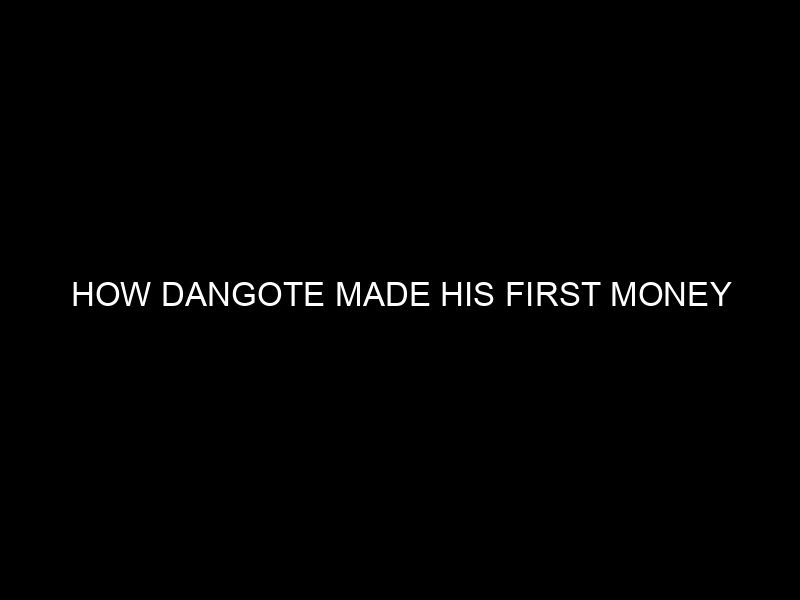As a professional with a background in Nigeria’s business landscape and an understanding of the Dangote Group’s evolution, I am well-equipped to narrate the inspiring journey of Aliko Dangote, Africa’s richest man. His journey from a local trader to a globally recognized industrial magnate is not just a tale of business success but also a lesson in strategic foresight, resilience, and innovative thinking. This article will explore how Dangote made his initial fortune, setting the foundation for his current status as a business icon.
The Genesis of Dangote’s Business Empire
Aliko Dangote’s initial foray into the business world was marked by a blend of inherited entrepreneurial spirit and a keen eye for opportunity. Born into a wealthy merchant family in Kano, Nigeria, Dangote was exposed to business practices and trading from an early age. This early exposure was crucial in shaping his business acumen.
The Initial Venture: Trading in Commodities
Dangote’s first significant step in the business world was through a loan of N500,000 (Nigerian Naira) from his uncle, Sanusi Dantata. He used this capital to start trading in commodities like rice, sugar, and cement in 1977. His choice of commodities was strategic, focusing on items that were in high demand in Nigeria. This decision was a masterstroke, as these commodities were not just essentials but also had a stable and growing market.
Expansion and Diversification
The initial success in trading provided Dangote with the capital and confidence to expand his business. He diversified into importing bulk commodities and became a major player in the Nigerian market. His ability to understand market dynamics and leverage connections established during his early trading days played a pivotal role in his success.
Building the Dangote Group
The transition from a trader to an industrialist was marked by Dangote’s decision to establish the Dangote Group. The conglomerate, which started as a small trading firm, has now morphed into one of Africa’s largest and most diversified business groups. It has interests in commodities, manufacturing, and real estate, among others.
Strategic Investment in Manufacturing
Dangote’s insight into the potential of local manufacturing in Nigeria was a game-changer. He realized early on that importing goods was a short-term strategy and that building local manufacturing capacity was key to long-term success. This led to the establishment of manufacturing plants for sugar, flour, and cement – commodities he once traded.
The Cement Revolution
The establishment of the Dangote Cement plant was a major milestone. Dangote capitalized on Nigeria’s need for infrastructure development and the high cost of importing cement. By producing cement locally, he not only reduced the cost of the commodity but also became a central figure in Nigeria’s construction boom.
The Impact on Nigeria’s Economy
Dangote’s businesses have had a significant impact on Nigeria’s economy. They have created thousands of jobs, reduced import dependency, and contributed to the country’s GDP. His success has also put Nigeria on the global business map, showcasing the potential of African entrepreneurs.
Challenges and Overcoming Them
Dangote’s journey was not without challenges. He faced issues like bureaucratic hurdles, infrastructural deficits, and market volatility. However, his ability to adapt and innovate helped him overcome these challenges.
FAQs
What was Aliko Dangote’s first business?
Aliko Dangote’s first business venture was trading in commodities such as rice, sugar, and cement in Nigeria.
How did Dangote start his business empire?
Dangote started his business empire with a loan of N500,000 from his uncle, which he used to trade in essential commodities.
What makes Dangote’s business strategy unique?
Dangote’s business strategy is marked by a focus on essential commodities, strategic expansion, and investment in local manufacturing to reduce import dependency.
How has Dangote impacted Nigeria’s economy?
Dangote has positively impacted Nigeria’s economy by creating jobs, contributing to the GDP, and reducing import dependency, thus fostering economic stability.
What were the major challenges faced by Dangote?
Major challenges faced by Dangote included bureaucratic hurdles, infrastructural deficits, and market volatility. His adaptability and innovative approach helped him navigate these challenges.
Conclusion
Aliko Dangote’s journey from a local commodity trader to a global business magnate is a testament to the power of vision, strategic planning, and resilience. His initial success in trading laid the foundation for what is today one of Africa’s most influential and diversified business empires. Dangote’s story is not just about wealth creation; it’s about the transformative power of entrepreneurship in developing economies. As Nigeria and Africa continue to evolve in the global economic landscape, the story of Dangote’s first money remains a source of inspiration and a blueprint for aspiring

Leave a Reply